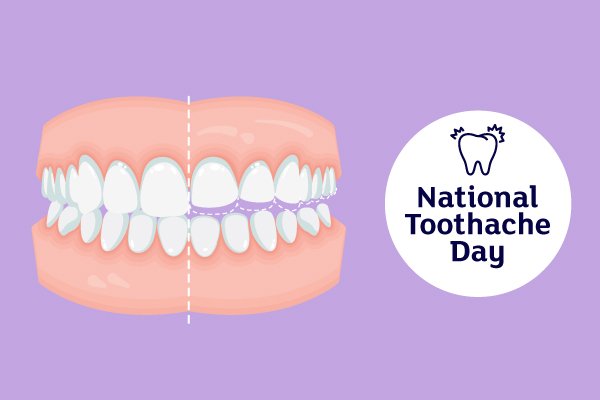Some effects of teeth grinding (like sore jaw muscles and headaches) are short-term and eventually disappear. In many cases, the effects can be long-term or even permanent. These can include hypersensitive teeth, worn enamel, and tenderness or pain in your jaw and face.
It’s best to treat the symptoms of grinding early on, rather than risk any further damage to your teeth.
What is toothache?
Toothache is a pain or ache that forms around the tooth. This could either be constant pain, or you may only experience it when you bite down. It occurs when the inner layer of the tooth (dental pulp) becomes inflamed. The pulp is made up of sensitive nerves and blood vessels.
What causes toothache?
The main cause of toothache is poor dental hygiene. If you don’t look after your teeth, or visit your dentist regularly, it can lead to problems that include:
- Periapical abscess – a collection of pus at the end of the tooth caused by bacterial infection.
- Tooth decay – decay causing bacteria generates acid that attacks the tooth’s surface or enamel. This can lead to a small hole in the mouth called a cavity.
- Cracked or damaged teeth – sometimes a crack can be so small that it’s hard to see with the naked eye.
- A loose or broken filling.
- Infection – this can happen when a tooth has broken through the skin.
Preventing toothache
The best way to avoid toothache and other dental related problems, is to keep your teeth and gums healthy. You can do this by following these steps:
- Eat a healthy diet. You can still have the occasional treat but limit your intake of sugary food and drinks.
- Brush your teeth twice a day using a toothpaste containing fluoride. This is a naturally occurring mineral that helps prevent tooth decay.
- Use dental floss every day to remove food, debris and plaque.
- If you experience symptoms of toothache, it’s important to investigate whether you may have a more serious condition such as bruxism.
What is Bruxism?
Affecting up to 31% of the general population, bruxism is a condition in which you excessively grind your teeth or clench your jaw.
There are two main types of bruxism: nocturnal bruxism (occurs during sleep), and awake bruxism (occurs during the daytime). Both men and women tend to be equally affected by sleep bruxism, but awake bruxism is more common in women.
Why do I grind my teeth?
There are many different reasons why you might grind your teeth. The most common factor is stress or anxiety. Nearly 70% of bruxism cases occur as a result of stress or anxiety.
Other reasons may include sleep-related disorders like obstructive sleep apnoea (OSA), or even certain lifestyle choices. Smoking, drinking a lot of caffeine, and drinking alcohol are all associated with a higher risk of bruxism. Regardless of which factors may be leading to you grinding your teeth, it’s good to understand how it could be affecting your day-to-day health, and how to treat it.
How to fix it
Using a mouthguard like the Bruxeeze Night Guard can offer great protection from grinding and clenching. The guard can be worn on your upper or lower teeth, and is easily moulded to fit your teeth in under 5 minutes.
Custom options are also available. The Bruxeeze Slim Fit Night Guard is great for first-time wearers, the Bruxeeze Pro Night Guard is ideal for moderate-to-heavy bruxers), and finally the Bruxeeze Pro Extra Night Guard is perfect for moderate-to-heavy grinders who like an additional level of comfort during the night.
For more information about the effects of bruxism, visit our Causes and Symptoms page. Don’t spend National Toothache Day in pain – take the first steps to a happier and healthier smile today.

